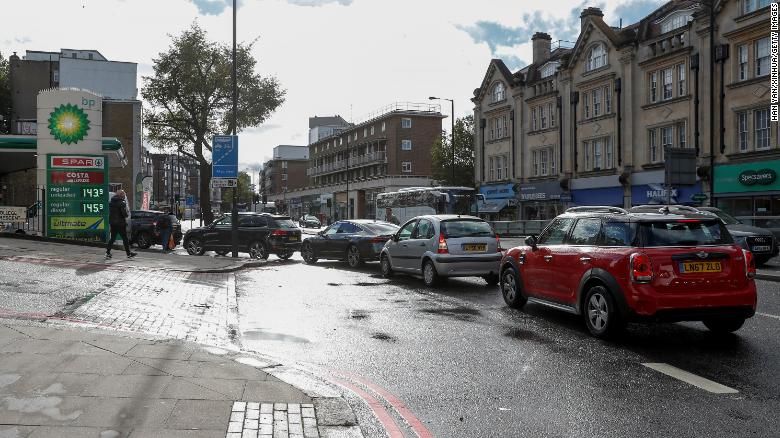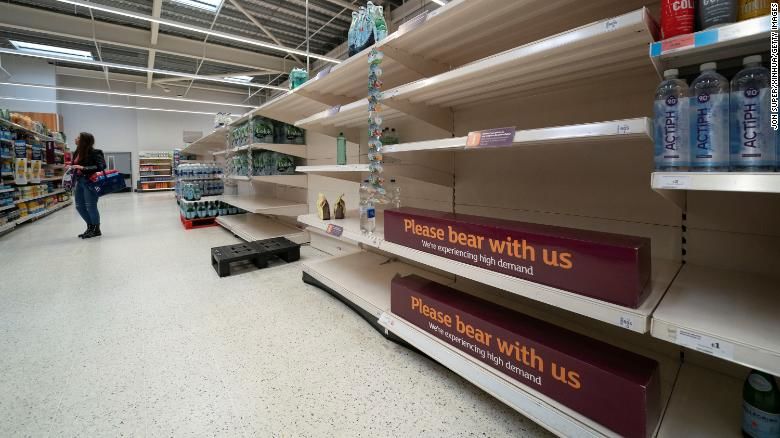
Analysis: Boris Johnson's Brexit choices are making Britain's fuel and food shortages worse
The crises afflicting the UK economy have sparked talk in newspapers and among politicians of a looming "winter of discontent," a reference to the wave of strike action in 1978-79 that brought the British economy to its knees. There's even talk of stagflation, the nightmare combination of stagnant growth and high inflation.
Although shortages, supply chain delays and rising food and energy costs are affecting several major economies, including the United States, China and Germany, Britain is suffering more than most because of Brexit.
Specifically, the form of Brexit pursued by the UK government — which introduced stringent immigration policies and took Britain out the EU market for goods and energy, making it much harder for British companies to hire European workers and much more costly for them to do business with the country's single biggest trading partner.
It didn't have to be this way — there were other options for a future EU-UK relationship. Worker shortages, for example, were not an inevitable outcome of Brexit, nor was going it alone on energy. But in Prime Minister Boris Johnson's ideological rush to "get Brexit done" amid fraught negotiations with the European Union, agreements in several crucial areas, including energy, were sidelined.
The UK government's post-Brexit immigration system, meanwhile, was designed to reduce the numbers of unskilled workers coming to Britain and end what the government described as the country's "reliance on cheap, low-skilled labor," despite a domestic unemployment rate in the region of just 5%.
"Ultimately, the government made a political decision to make low-skilled immigration more difficult," said Joe Marshall, a senior researcher at the Institute for Government, an independent think tank. "Labor shortages may have been less severe if the UK had retained free movement of people post-Brexit," he added.
Britain had a record 1 million job vacancies between June and August, according to the Office for National Statistics. Restaurants, pubs and supermarkets, including Nando's, had to temporarily close some locations last month due to staff shortages or because certain ingredients weren't delivered as a result of fewer truck drivers.
The adult social care sector also faces a "workforce crisis" and will need to recruit overseas workers to fill tens of thousands of vacancies, according to Care England, which represents independent providers.
Supply chain constraints exacerbated by Brexit means that UK consumers are facing surging food and energy bills at the same time that pandemic support measures are being unwound, including government support for wages and a £20 ($27) weekly uplift to social security payments.
Chronic labor shortages
This week the UK government was forced to partly back track on its stringent post-Brexit immigration policy after thousands of gas stations ran dry over the weekend and food retailers warned that the country had just 10 days to "save Christmas."
In an interview with broadcasters on Tuesday, Transport Secretary Grant Shapps acknowledged that Brexit "no doubt will have been a factor" in contributing to the fuel supply crisis.
To ease the pressure, the government will issue temporary visas to 10,500 foreign truck drivers and poultry industry workers. But industry groups say the measure won't make much difference, in part because it's unclear whether EU workers want to come back to a country that's become more hostile to their presence.
British Chambers of Commerce President Ruby McGregor-Smith said that even if short-term visas attract the maximum numbers allowed, "it will not be enough to address the scale of the problem that has now developed in our supply chains." She likened it to "throwing a thimble of water on a bonfire."
The UK military is now on standby for fuel deliveries amid warnings from the British Medical Association that healthcare workers, including ambulance drivers, won't be able to do their jobs as pumps run dry, although the Petrol Retailers Association said on Tuesday that there are "early signs that the crisis at pumps is ending."
 Vehicles are seen outside a petrol station in London on September 27.
Vehicles are seen outside a petrol station in London on September 27.
The shortage of drivers has been exacerbated by Brexit, which resulted in tens of thousands of EU nationals leaving trucking jobs and other occupations in the United Kingdom. Johnson's decision to end the free movement of workers following Brexit has also made it more difficult for Europeans who had returned home during the pandemic to come back.
While many have a right to remain in Britain, they have been made to feel "pretty unwelcome" because of Brexit, said L. Alan Winters, founding director of the UK Trade Policy Observatory at the University of Sussex.
"Covid was just the straw that broke the camel's back, in the sense that things have just become less pleasant here [for EU workers]," he added.
The exodus of workers is a major problem for many sectors, which over four decades of EU membership had come to rely on a steady inflow of labor.
"The supply of EU labor was turned off with no clear roadmap as to how this transition would be managed without disruption to services and supply chains," said McGregor-Smith. "A managed transition, with a plan agreed between government and business, should have been in place from the outset."
A recent Grant Thornton report commissioned by the food and drink industry estimated that there are in excess of 500,000 vacancies across the sector.
Farms and food processors have been forced to cut back production or simply let crops go to waste because they don't have enough workers. That's leading to reduced ranges of products at supermarkets and in some cases empty shelves.
 Empty shelves are seen at a supermarket in Manchester, Britain, on September 22.
Empty shelves are seen at a supermarket in Manchester, Britain, on September 22.
"The labor crisis is a Brexit issue, and one that has been widely reported across the food and drink sector," Richard Griffiths, chief executive of the British Poultry Council, said in a statement last month.
According to Nick Allen, the CEO of the British Meat Processors Association (BMPA), a lot of farmers simply haven't reared turkeys in the lead up to Christmas because labor supply was so uncertain.
"There will be a shortage [of turkeys]," Allen told CNN Business, adding that other Christmas favorites such as gammon and pigs-in-blankets (sausages wrapped in bacon), will likely also be in short supply.
Data from Adimo, a shopping technology platform that tracks consumer interest in 300 brands, shows that the percentage of products out of stock in UK supermarkets is reaching levels experienced in March 2020, when shoppers were panic buying as coronavirus cases climbed.
The company predicts that by early December, UK shoppers will experience worse grocery shortages than at the peak of the pandemic last year.
Alcohol, dairy, meats and frozen foods are going to be the most affected, according to Adimo CEO Richard Kelly. "A lack of choice and rising supply chain costs will all affect the price customers have to pay for their weekly or Christmas shop," Kelly added.
Increasing wages on farms and in food processing plants to attract more British workers will also eventually filter through to higher prices, said Allen. "We all want a high wage economy ... but somebody has to pay for it."
Energy crisis
Rising food prices come as Britain grapples with a spike in natural gas and electricity costs, driven in part by chilly spring temperatures earlier this year, rising demand from China and lower supplies from Russia.
Soaring energy prices are a problem in Europe too. But the situation is particularly acute in the United Kingdom because the supply crunch has been exacerbated by a lack of large natural gas storage facilities, delayed maintenance work and a fire that shut down a power cable from France.
Earlier this month, skyrocketing gas prices prompted a major US fertilizer manufacturer to suspend production in Britain, turning off most of the country's supply of carbon dioxide to the food and drink industry in the process. The gas is used to stun animals for slaughter, as well as in packaging to extend the shelf life of fresh, chilled and baked goods, and in the production of carbonated drinks.
None of these problems can be blamed on Brexit, but the minimalist EU trade deal Johnson signed last December has left the United Kingdom to navigate the current crisis alone because it did not include any agreement on energy. That meant Britain left the EU internal energy market on December 31, 2020.
"There isn't that closeness of cooperation [between the United Kingdom and European Union] on security of [energy] supply," said Lilah Howson-Smith, a senior associate at Global Counsel, a policy advisory firm. This has left the UK government with fewer levers at its disposal to manage current challenges, she added.
These include access to storage facilities and solidarity among EU member states, which contributes to security of supply, according to a 2016 report commissioned by National Grid, a utilities company, which found that leaving the internal energy market could cause UK energy bills to soar by up to £500 million ($677.8 million) a year.
"Though uncertain, the impact of Brexit on the UK energy system is very likely to be negative," the report said.
Economists are already warning that sustained upward pressure on prices driven by worker shortages, snarled supply chains and rising energy costs will weigh on UK growth and increase inflation, which is already at its highest level in more than two decades.
Britain's economy remains 2.1% smaller than before the pandemic and economists at Berenberg recently pushed back their forecast for a full recovery to the second quarter of 2022.
By comparison, S&P Global Ratings expects Europe to return to its pre-crisis level of GDP before the end of this year, one quarter earlier than previously forecast, suggesting that the diverging fortunes of the UK and EU economies, already apparent in growth and investment patterns since the Brexit referendum in 2016, looks set to continue.










